
Francesco Guccini is an Italian singer-songwriter, considered one of the most important cantautori. During the five decades of his music career he has recorded 16 studio albums and collections, and 6 live albums. He is also a writer, having published autobiographic and noir novels, and a comics writer. Guccini also worked as actor, soundtrack composer, lexicographer and dialectologist.

Le Orme is an Italian progressive rock band formed in 1966 in Marghera, a frazione of Venice. The band was one of the major groups of the Italian progressive rock scene in the 1970s. They are one of few Italian rock bands to have success outside their own country, having played concerts across North America and Europe, and releasing an album in English at the height of their success.
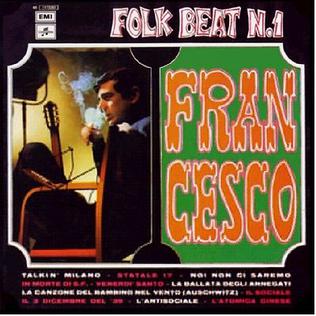
Folk beat n°1 (1967) is the first album of Italian singer-songwriter Francesco Guccini. It was published under the name "Francesco" alone.
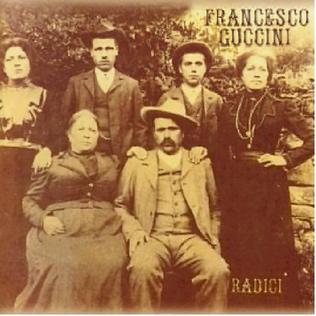
Radici is an album of Italian singer-songwriter Francesco Guccini. It was released in 1972 by EMI.

L'isola non trovata is an album of Italian singer-songwriter Francesco Guccini. It was released in December 1970 by EMI, under the nickname "Francesco".
Fabbri is an Italian surname and may refer to:
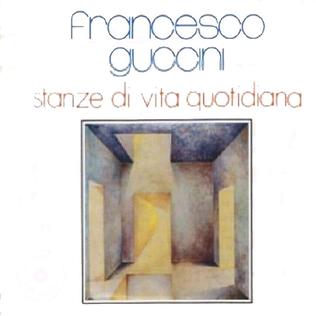
Stanze di vita quotidiana is an album from Italian singer-songwriter Francesco Guccini. It was released in 1974 by EMI Italiana. The title means "rooms of everyday life". Each piece in the album is titled with the prefix "Song of...". Some common themes in the album are solitude, memory of lost loved ones, sadness, and fear of death. They are often presented with a pessimistic and melancholic mood.
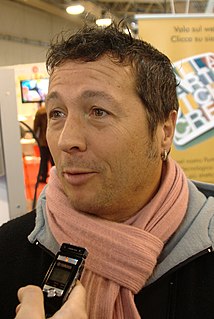
Paolo Belli is an Italian singer and television presenter.
Alessandro Perissinotto is an Italian writer, translator and university professor.
Stagioni is the nineteenth album by Italian singer-songwriter Francesco Guccini. The title means seasons, and three of the songs of the album are named after a season. It was released in 2000 by EMI, and was at the top of the Italian album chart for one week.
Parnassius Guccinii is the sixteenth album by Italian singer-songwriter Francesco Guccini. The title references a butterfly subspecies named after the artist. It was released in 1993 by EMI and was generally well received.
Quello che non... is the fifteenth album by Italian singer-songwriter Francesco Guccini. It was released in 1990 by EMI.
Due anni dopo is the second album by Italian singer-songwriter Francesco Guccini. It was released in 1970 by EMI.
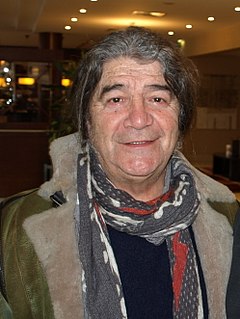
Giampiero Anelli, best known as Drupi, is an Italian-born Austrian rock singer, best known for the songs "Vado via", "Piccola e fragile", "Sereno è" and "Due".

Gaetano Cristiano Vincenzo Rossi, best known as Christian, is an Italian singer, mainly successful in the first half of the 1980s.
Leano Morelli is an Italian singer-songwriter and musician.

Ellade Bandini is an Italian drummer.
"Auschwitz" is a song composed by Francesco Guccini, and performed by Equipe 84. Although the song was written by Guccini it was credited to Lunero and Maurizio Vandelli as the author was not a member of the SIAE. The following year the song was recorded by Francesco Guccini and included in the LP Folk beat n. 1, with the title La canzone del bambino nel vento (Auschwitz).

Una storia sbagliata is a song written and recorded by Italian singer-songwriter Fabrizio De André and co-composed with folk songwriter Massimo Bubola. It was initially released as a single backed with "Titti". Both songs were recorded during the initial sessions for De André's self-titled 1981 album and first released in 1980 as a standalone single. In 1999, "Una storia sbagliata" was re-released within the Fabrizio De André: Opere complete box set. "Titti" had its first CD release in 2005, within the greatest hits and rarities collection In direzione ostinata e contraria.

Fabrizio De André in Concerto - Arrangiamenti PFM ["In Concert—Arrangements by PFM"] is a 1979 live album by Fabrizio De André featuring Italian progressive rock band Premiata Forneria Marconi, also known as PFM, as his backing band, recorded during their successful 1979 tour of Italy and Europe. Built on powerful, complex and carefully crafted rock arrangements, either by single band members or by the band as a unit, the album marked a significant stylistic and musical departure for De André, whose production up to that point had always employed acoustic-based, folk arrangements, occasionally branching into pop but never overtly using rock structures and instrumentation. Upon release, the album became immediately very popular and paved the way for other Italian singer-songwriters for their own transition from a folk style into a more rock-oriented one. The album was followed by a Volume 2 the next year, recorded during the same shows.












